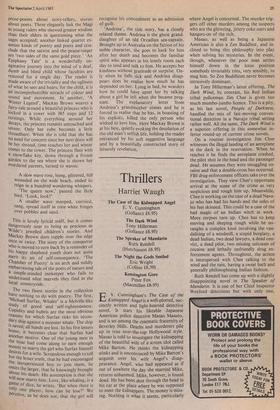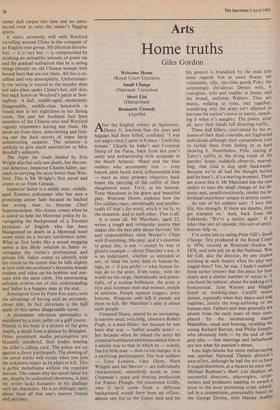Thrillers
Harriet Waugh
The Case of the Kidnapped Angel E. V. Cunningham (Gollancz £6.95)
The Dark Wind Tony Hillerman (Gollancz £6.95) The Speaker of Mandarin Ruth Rendell
(Hutchinson £6.95)
The Night the Gods Smiled Eric Wright (Collins £6.50) Kensington Gore Peter Fox
(Macmillan £6.95)
E. V. Cunningham's The Case of the Kidnapped Angelis a well-plotted, suc- cinctly written and light-hearted detective novel. It stars his likeable Japanese American police detective Masao Masuto, and is set among the cinematic fraternity of Beverley Hills. Deaths and murderers pile up in true over-the-top Hollywood style. Masao is told to investigate the kidnapping of the beautiful wife of a screen idol called Mike Barton. He thinks the kidnapping stinks and is unconvinced by Mike Barton's anguish over his wife Angel's disap- pearance. Angel, who had appeared as if out of nowhere the day she married Mike, returns unharmed. Mike, however, is found dead. He has been shot through the head in his car at the place where he was supposed to meet the kidnappers. The money is miss- ing. Nothing is what it seems, particularly
where Angel is concerned. The murder trig- gers off other murders among the suspects who are the glittering, jittery coke users and hangers-on of the rich.
Masao, as well as being a Japanese American is also a Zen Buddhist, and in- clined to bring this philosophy into play when solving his mysteries. In the event, though, whenever the poor man settles himself down in the lotus position somebody invariably tries, very sensibly, to mug him. So Zen Buddhism never becomes intrusively dominant.
In Tony Hillerman's latest offering, The Dark Wind, by contrast, his Red Indian tribal policeman Jim Chee is given too much mumbo-jumbo licence. This is a pity, as his last novel, People of Darkness, handled the mix of fast-moving conven- tional detection in a Navajo tribal setting rather well. All the same, The Dark Wind is a superior offering in this somewhat in- ferior round-up of current crime novels.
On a routine investigation Jim Chee witnesses the illegal landing of an aeroplane in the dark in the reservation. When he reaches it he finds the aeroplane crashed, the pilot shot in the head and the passenger dead. He assumes they were smuggling co- caine and that a double-cross has occurred. FBI drug enforcement officers take over the investigation. They view Chee's opportune arrival at the scene of the crime as very suspicious and rough him up. Meanwhile, Chee is working on the case of a dead Nava- jo who has had his hands and the soles of his feet skinned. This could be a case of the bad magic of an Indian witch at work. More corpses turn up. Chee has to keep moving and sleeping rough while he un- tangles a complex knot involving the van- dalising of a windmill, a stupid burglary, a dead Indian, two dead lawyers, a dead con- vict, a dead pilot, two missing suitcases of cocaine and lethally unfriendly drug en- forcement agents. Throughout, the action is interspersed with Chee talking to the wind and the rain, having a sweat bath and generally philosophising Indian fashion, Ruth Rendell has come up with a slightly disappointing novel in The Speaker of Mandarin. It is one of her Chief Inspector Wexford detections but with only one,
rather dull corpse this time and no unex- pected twist to raise the reader's flagging spirits.
It starts extremely well with Wexford travelling around China in the company of an English tour group. His physical discom- fort — it is very hot — is compounded by drinking an unhealthy amount of green tea and the gradual realisation that he is seeing things (mostly on old Chinese woman with bound feet) that are not there. All this is ex- cellent and very atmospheric. Unfortunate- ly the setting is wasted as the murder does not take place under China's hot, still skies but back home on Wexford's patch at Sew- ingbury. A dull, middle-aged, moderately disagreeable, middle-class housewife is found shot in her nightdress in her dining room. She and her husband had been members of the Chinese tour and Wexford vaguely remembers having met them. He plods on from there, interviewing and find- ing out the dark secrets of some fairly uninteresting suspects. The solution is unlikely to give much satisfaction to Miss Rendell's admirers.
The Night the Gods Smiled by Eric Wright also has only one death, but the cen- tral detective, Inspector Charles Salter, suc- ceeds in carrying the story better than Wex- ford. This is Mr Wright's first novel and comes to us from Canada.
Inspector Salter is a mildly sour, middle- aged Toronto policeman who has seen a promising career fade because he backed the wrong man to become Chief Superintendant. His chance comes when he is asked to help the Montreal police by in- vestigating the background of a Toronto professor of English who has been bludgeoned to death in a Montreal hotel room while on a literary conference spree. What at first looks like a sexual mugging seems a less likely solution as Salter in- vestigates the victim's professional and private life. Salter comes to identify with the victim to the extent that he falls slightly in love with the professor's favourite female student and takes up his hobbies and pur- suits with the same relish. The entertaining solution evolves out of this understanding and Salter is a happier man at the end.
Kensington Gore by Peter Fox starts with the advantage of having such an extremely clever title. In fact cleverness is the hall mark of this rather disagreeable novel.
A prominent television personality is murdered by a toxic pellet on a golf course. Pinned to his body is a picture of the grim, reaper, a detail from a picture by Brueghel. Other prominent media personalities are bizzarely murdered, their bodies bearing the killer's calling card. The police are up against a clever psychopath. The plotting of the novel works well except when you join the unknown reaper as he plans to kill. This is gothic melodrama without the requisite tension. The reason why the novel failed for me, despite its undoubted cleverness, is that the writer lacks humanity in his dealings with his characters. He is so chillingly nasty about them all that one's interest freezes and perishes.







































 Previous page
Previous page